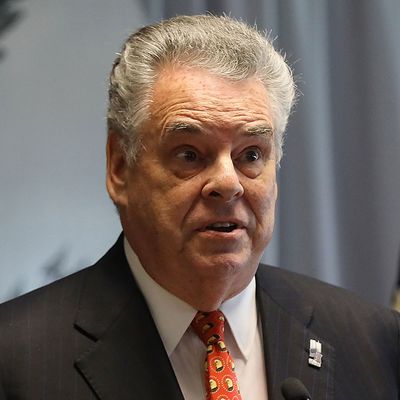
For proponents and opponents of the Graham-Cassidy health-care bill, all eyes are on the Senate presently, for the obvious reason that this dubious legislation is meaningless unless it earns 50 Senate votes by September 30. That’s when the budget resolution that launched the entire GOP health-care circus of 2017 vanishes like Cinderella’s coach at midnight, as the Senate parliamentarian ruled.
When the budget resolution disappears, the Republicans can’t pass anything without 60 votes. And that means if Graham-Cassidy passes, the House will have the simple choice of dumping its own Obamacare repeal-and-replace bill, the American Health Care Act, and rubber-stamping Graham-Cassidy, or giving those Obamacare-hating Republican “base” voters one final bitter disappointment by killing the whole thing yet again. There’s nothing much more frustrating than a zombie.
The trouble is, the GOP had to do some serious vote-buying to get AHCA passed 217–213 back in May. The best-known is the so-called “Buffalo Bribe,” which shifted some county Medicaid expenses in upstate New York to Albany, enraging Governor Andrew Cuomo. The “bribe” was instrumental in securing six House GOP votes from New York for AHCA, which was a pretty big deal. Indeed, when the Senate designed its own version of Trumpcare, the “bribe” stayed in, even though there was no amount of money on earth that would have secured the votes of New York’s two senators.
But all that is so, so July at this point. BCRA and AHCA are both moot, and Graham-Cassidy’s the only game in town. So far as we know, there is no “Buffalo Bribe” in this latest bill. Even if one were to be nestled into Graham-Cassidy, there’s a more pressing problem for New York Republicans: The basic thrust of the bill really, really screws over states like New York by redistributing Medicaid expansion money to non-expansion states.
That’s why one prominent House Republican who supported AHCA, Peter King, is saying he’s off the Trumpcare Train this time: “Right now, I don’t see how I could vote for it … It’s extremely damaging to New York.” And he’s not talking about the “bribe.” He points out that when he and many other House moderate Republicans voted for AHCA they expected the bill’s nasty Medicaid cuts would be relaxed in the Senate. Instead, particularly in Graham-Cassidy, they’ve gotten much worse, particularly for states like New York (which would lose an estimated $33 billion in Medicaid and tax-credit dollars by 2027) and California (a $57 billion loser).
While Republicans have a bigger cushion for controversial legislation in the House than in the Senate, it’s not all that plush: There are 21 House Republicans from California and New York who voted for AHCA. And if the Senate bill’s sponsors go too far in trying to buy them off one by one, they might stir up trouble with crucial House members on their right flank. And there’s also the problem that CBO might release its probably deadly estimates of what Graham-Cassidy would do to the budget, health-care coverage, and insurance premiums before the House can act.
You get the feeling that Republican leadership is betting that House Republicans won’t be able to bring themselves to vote to kill the final, no-more-excuses, cookies-on-the-line bill to repeal Obamacare. According to Lindsey Graham, Paul Ryan blithely said to him today: “You pass it, we pass it,” as though he’s got full control of his caucus. If it were all that easy, it would have happened back in January, as Ryan promised even before the election, when he was describing the budget procedures that have turned out to be such a pain in the butt as “a bazooka in my pocket” that would blow Obamacare out of existence immediately. Even if the Senate approves Graham-Cassidy, the GOP’s agony may continue.






























